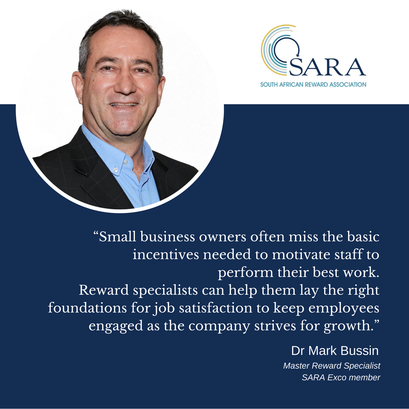|
The country’s celebration of a welcome change in leadership was quickly followed by an upbeat State of the Nation Address from newly-elected President Cyril Ramaphosa. Acknowledging that South Africa’s economy will be sustained by small businesses, the President stated that it is “our shared responsibility to grow this vital sector.” In a closing reference to Hugh Masekela’s song “Thuma Mina”, he concluded: “Now is the time to lend a hand. Now is the time for each of us to say ‘send me’.”
The reward practitioner's role Dr Mark Bussin, Master Reward Specialist, Executive Committee Member of SARA (South African Reward Association) and Chair of 21st Century agrees completely. “There is a definite opportunity for reward practitioners to play a role and lend a hand to small businesses,” he says. According to Dr Bussin, SARA members are typically employed by large corporations, but can still do their part by offering free advice and services to small business managers and startup entrepreneurs. “We may have family, friends or acquaintances who run or are starting their own business, and who employ several workers. This is a great opportunity to contribute to their growth because at that level, not many consider the productivity fostered by a solid reward structure.” Introducing reward to small business Small business owners are often completely focused on operations, finances, marketing and sales but miss the basic incentives needed to motivate staff to perform their best work. Reward specialists can help them lay the right foundations for job satisfaction to keep employees engaged as the company strives for growth. Dr Bussin mentions several elements that must be in place from the start: “If these are cobbled together too late, only after dissatisfaction arises, employers could find their business suddenly struggling as their top workers exit.” His points include being clear on job descriptions and their responsibilities; establishing who reports to whom; defining pay scales with minimum and maximum limits; ensuring meticulous tax administration; documenting the rules governing bonus schemes; clarifying if employees have ownership in the company or not; having employment contracts that respect the law; and developing clear recognition schemes and promotion paths. While small businesses are usually not capable of offering extended non-financial rewards, they should start planning for a time of growth when development, training, a pleasant work environment, wellness programmes and other incentive schemes become more important to attracting and retaining valuable talent. How big businesses can help Dr Bussin also strongly encourages large organisations to become involved in such initiatives rather than discouraging them. “Every corporation should identify several small business candidates and lend out their reward practitioners for free for an hour or two a week as part of their CSI projects,” he says. “Just doing this, they too could make a significant contribution to the economy.” Small businesses face many challenges getting off the ground and surviving their first five years. Reward professionals can answer the call of “send me” by helping them build a motivated, loyal workforce to add greater assurance of their success, especially when the going gets tough. ENDS MEDIA CONTACT: Juanita Vorster, 079 523 8374, [email protected], www.atthatpoint.co.za For more information on SARA please visit: Website: www.sara.co.za Twitter: @SA_reward LinkedIn: South African Reward Association Facebook: SARA – South African Reward Association
0 Comments
Leave a Reply. |
Archives
March 2023
Welcome to the South African Reward Association newsroom.
Categories
All
|


 RSS Feed
RSS Feed